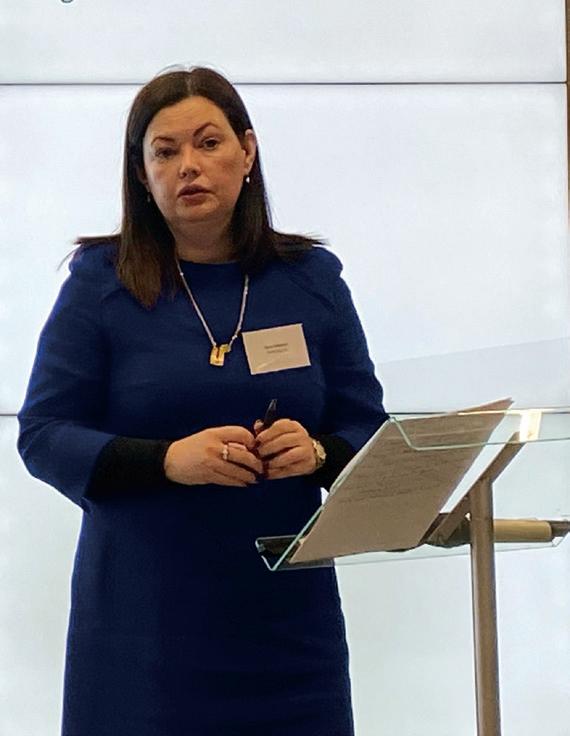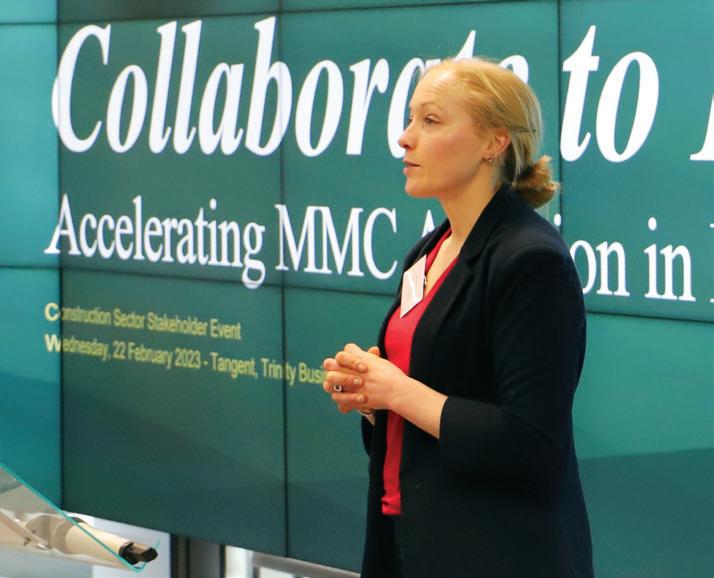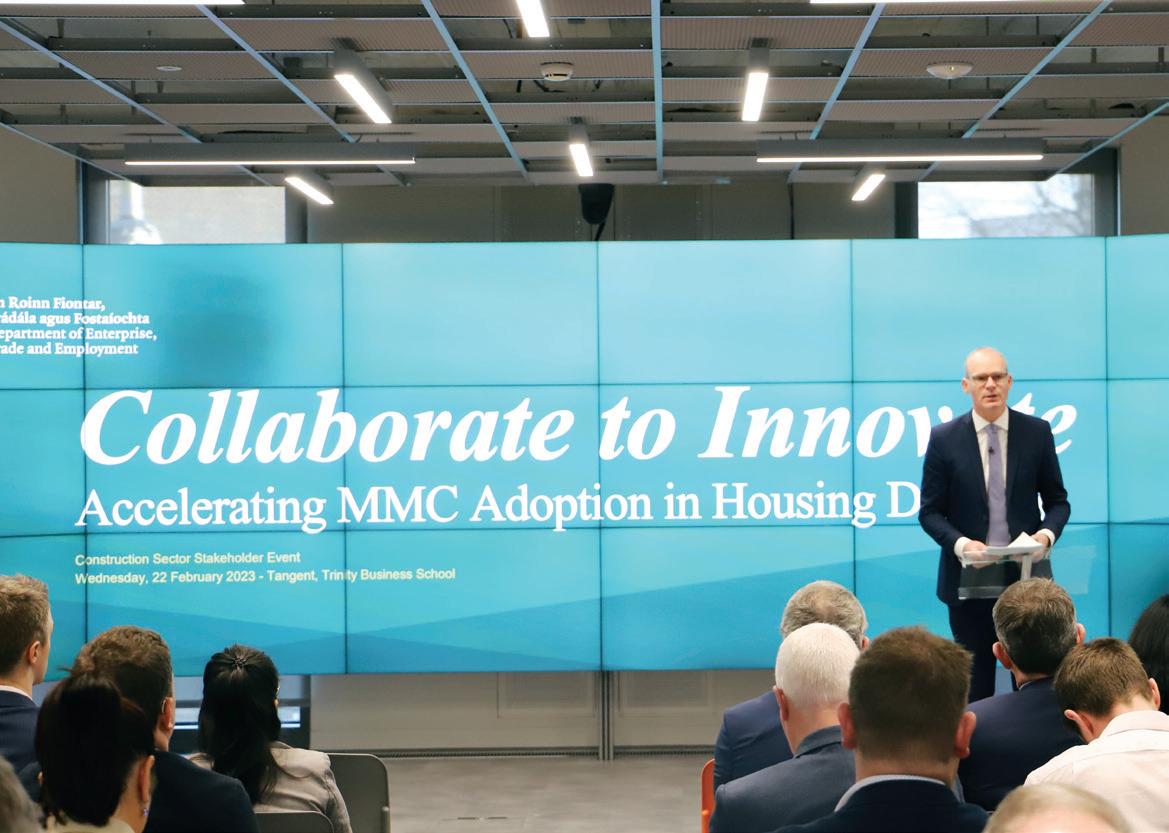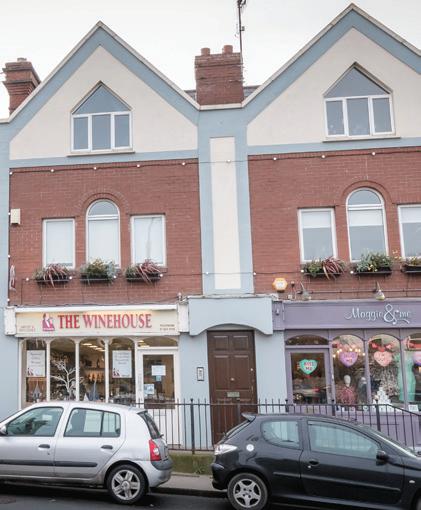THE


































































What


We have the tools, knowledge & expertise to make your property business a success. Websites designed to engage Vendors & Landlord.
The most cost e ective online bidding system on the Irish Market.
Manage and nurture your leads. Be alerted when long term leads become active. Streamline processes with auto-marketing.
Facebook and Google Ad campaigns including Remarketing. Target the Vendors & Landlords that have been on your site recently.
 Ireland No1 Property CRM. Manage Property Sales & Lettings easily.
Ireland No1 Property CRM. Manage Property Sales & Lettings easily.
Welcome to our latest edition of The Property Professional. Housing policy in recent weeks has been dominated by the eviction ban which expired at the end of March. The debate surrounding it was nothing short of appalling in the way it set landlords against tenants. The vast majority have very good working relationships, as you well know. Research by the Residential Tenancies Board in 2021 found that 79% of tenants found their experience of renting in the private rental sector as ‘positive’ or ‘very positive’.
Housing continues to be treated as a political football, unfortunately, and much of the media debate has been sensationalist rather than contributing to a genuine discussion of the issues.
Having said that, when political controversy on the ban reached its zenith some realism prevailed, with a series of practical measures that will impact positively. Not least among these were initiatives IPAV has been advocating for over a considerable period, including amending Housing Assistance Payment rules to guarantee the Local Authority portion of rent to landlords where a tenant defaults, until the situation is resolved.
It was notable that KPMG, a firm servicing Foreign Direct Investment, recently said: “urgent tax reform is necessary to level the playing field for professional landlords who make a very important contribution to a sector of the Irish rental market not typically the focus of international institutional investors”.


As you will read elsewhere in this edition, some senior policy influencers seem to be of the belief that private landlords are dispensable. That remains a challenge.
I look forward to liaising with you, our members, over the next number of weeks and working on these issues. Our policy objective remains – to influence Government decisions with the ultimate aim of achieving a sustainable market that supports people in renting, buying or selling according to need.
Meanwhile, I hope you will find the following content informative and stimulating.

“Already
You are most welcome to the latest edition of The Property Professional. In the second quarter of the year speculation is rife on the subject of where the market is going, about where house prices will end up this year, and whether or not the banking challenges we’re seeing internationally, particularly the demise of Silicon Valley Bank and Credit Suisse, could spill over into the wider international economy, with obvious implications for our own domestic economy.
While particular management failings are being associated with these institutions, the implication being that the virus is unlikely to spread, nonetheless, it is to be hoped that the concerns at play will have a dampening effect on the European Central Bank’s race to continue increasing interest rates.
Already up by 3.5% since July last, ECB policy decisions have huge implications for existing and prospective borrowers. It is striking that mortgage arrears figures published by the Central Bank at the end of March showed the numbers in new arrears, up to 90 days, have jumped almost five times that of the previous quarter (2,307 up from 494). This demonstrates the distress being caused to borrowers as a result of rapidly rising interest rates.
An additional factor is that given this, the likely push towards more stringent lending conditions by banks. They will become more cautious resulting in applicants who previously would have qualified for a mortgage, may not now do so.
While that is the buyer perspective, all is not well looking at the provider aspect either. Worryingly, commencement notice figures for February 2023 were registered at 1,997, a drop from 2,327 in the same month last year.
The status quo set of policy measures on housing are grossly inadequate. And almost every initiative comes with unintended consequences, including the Residential Zoned Land Tax, which IPAV flagged strongly in our last edition. One has to be concerned at the quality of advice available to Ministers given the cacophony of such measures.
The real challenge lies in getting political cohesion around the right set of measures to get building ramped up against a backdrop of higher interest rates and continuing inflationary pressures that do not appear to be abating. In this regard Budget 2024 will be critical.

up by 3.5% since July last, ECB policy decisions have huge implications for existing and prospective borrowers.”


We are delighted to welcome Dennis to Ireland as IPAV's Main Valuation speaker, who has a life time of experience as a property and business valuer


Whether you are looking to buy, sell or you are happily staying put, be inspired by Property & Home magazine in Saturday’s Irish Examiner.
• We bring you through the keyhole of a range of properties on the market each week, from rural retreats to urban sophistication.





• Our Home section opens the door to the latest, must-have interiors trends, from sublime sofas to cosy cushions.




• Garden lovers can dig deep with expert advice.
Plus antiques and fine art with a diary of upcoming events not to be missed.




To advertise in Property & Home magazine email propertyads@examiner.ie












On May 17, an Oireachtas Committee meeting on the topic of revitalising derelict and vacant houses on farmland warmly greeted IPAV’s proposals, saying they represented very practical solutions to the issue. IPAV, represented by Chief Executive, Pat Davitt and Senior Vice-President, John Kennedy, were first up to present to the Joint Committee on Agriculture, Food and the Marine, and were followed by a number of farming organisations. Pat gave a short presentation in which he called on the Minister for Finance to amend the Credit Union (Amendment) Bill 2022, currently going through the Oireachtas, to make provision for Credit Unions to provide bridging finance to those wishing to buy vacant and derelict properties. This would address the major gap in the market whereby lenders currently have a grave reluctance to provide mortgages until such time as vacant and derelict properties are restored to a habitable state, he told the Committee. In a question and answer session, he also highlighted the need for a Capital Gains Tax amnesty for a period of time, perhaps two or three years. Such properties would typically have gained value over time generating a high CGT requirement on sale that for many would prove a disincentive to sell their vacant or derelict properties. Click to download IPAV Press Release


IPAV’s educational programme provides an ideal bridge for individuals currently working or entering the property profession. The courses listed below are currently open for registration:
For individuals looking to apply for a PSP licence in category
A, B, C and D:
IPAV, in conjunction with TU Dublin, o ers a Level 6 (120 ECTS) Higher Certificate Business in Real Estate, Valuation, Sale & Management.
Duration: 2 academic years
Delivery: Blended learning with approximately 4-5 classroom-based lectures each semester held on campus at TU Dublin, Tallaght, Dublin 24.
Registration: Deadline Thursday 6th July 2023.
Cost: €3500 per year
For individuals looking to qualify with knowledge and competency to support the property professional and their clients:
IPAV in conjunction Technology University of the Shannon o ers a Level 6 (60 ECTS) Certificate in Real Estate Administration.
Duration: 1 academic year (24 weeks)
Delivery: Online learning, online lectures Mondays & Wednesdays 6.30pm – 10pm, plus 2 Saturdays per semester online 9.30am – 12.30pm.
Note: This course is not for those who are looking to obtain the educational requirements to apply for a property licence.
Cost: €1500
For individuals looking to looking to apply for a PSP licence in category A:
In partnership with ICOS and TU Dublin, IPAV o ers a Special Purpose Award Top Up route for Green Cert Graduates.
Duration: 6-8 months

Delivery: Online
Cost: €2750
This course is run strictly on a demand basis.

Hello again to all our members, and welcome to the Q2 edition of our fabulous, new-look magazine. I recently came across a very interesting fact and statistic by John Bersin, which I would like to share with you all. In the research he carried out it was found that companies that embrace equality, diversity and inclusion in all aspects of their business on a daily basis statistically outperform their peers. That’s something that’s definitely worth noting for all of our workplaces, companies and institutes. Our EDI team here in IPAV have been working away to be able to bring you the latest EDI events taking place in Q2. We would be delighted to learn of EDI events that are taking place in any of our members’ own workplaces and local areas also. Talk to you all again in Q3.

Here we have listed just some of the EDI events that have taken place over the last couple of months, and also some upcoming events.
April 2nd:
World Autism Awareness Day
April 22nd:
Earth Day
28th April:
National Wellbeing Workplace Day

May 17th:
The International Day Against Homophobia, Transphobia and Biphobia
June:
LGBTQIA+ & Pride Month
June 18th:
Autistic Pride Day
June 20th:
World Refugee Day
If you would also like to send us some photos/details of any of these events, please do get in touch in with our EDI team valerie@ipav.ie
June
22nd – 26th:
Dublin Pride Festival
Tailte Éireann, a new State agency to manage and develop Ireland’s land, property, and location data.

The Property Registration Authority, the Valuation Office, and Ordnance Survey Ireland have merged to become a new organisation called Tailte Éireann.




Tailte Éireann provides a comprehensive and secure property title registration system, a professional State Valuation service, and an authoritative national mapping and surveying infrastructure.


Business will continue as usual while Tailte Éireann is being established. Customers can continue to use existing channels for all registration, valuation, and surveying services.
Find out more at tailte.ie





Minister Simon Coveney TD hosts construction industry outreach event, to examine how best to promote innovation in the sector and accelerate the adoption of modern methods of construction in the delivery of housing.


To support the Government’s ambitions set out in Housing for All, the Department of Enterprise, Trade and Employment has been tasked with promoting construction innovation and the widespread adoption of Modern Methods of Construction.


Over the past 18 months, the Department has delivered several key initiatives to boost construction innovation. Enterprise Ireland has established the Construct Innovate Technology Centre (Ireland’s National Construction Research and Development hub) and, through the Built to Innovate initiative, is targeting a new cohort of domestically focused construction companies for innovation and productivity schemes. The Department has also been working closely with other Government Departments, Solas and Laois-Offaly Education and Training Board, on the development of a new Demonstration Park for MMC in Mount Lucas, Co. Offaly that will showcase innovative construction methods in housing, and will open later this year.
Innovation in construction is a multi-faceted policy area, stretching across building regulation, standards and certification, research and development, procurement, skills, business development, and more. Collaboration between policymakers and industry is essential to ensure that we are developing the right policies, and engagement with the construction industry is crucial.
In this context, on February 22nd Minister Coveney opened Collaborate to Innovate, the Department’s first construction innovation stakeholder event. Trinity’s Tangent ideas space played host to the event, which was very well attended, with over 80 invited attendees representing a broad range of industry and professional representative bodies (from engineers and architects to homebuilders, as well as associated professions such as insurers, legal and finance professionals).
The Institute of Professional Auctioneers & Valuers was duly represented. Other Government Departments including the Department of the Taoiseach, the Department of Further and Higher Education, Research, Innovation and Science, the Department of Public Expenditure, National Development Plan Delivery and Reform, and the Department of Finance also participated in the event. There was also a strong presence from the Department of Housing, Local Government and Heritage and associated housing agencies.
Participants were encouraged to offer their views on ways to remove barriers to MMC adoption in residential construction. The feedback
RIGHT: Clare Eriksson from TU Dublin explained the work by the Build Digital project to promote digitalisation of the industry.
BELOW: Assistant Secretary General of the Department of Enterprise, Trade and Employment, Declan Hughes sets the scene.
ABOVE: Feargal Ó Coigligh, A/Sec Housing Policy, Governance and Legislation in the Department of Housing, Local Government and Heritage.
BELOW: Seán Balfe gave an overview of the National Standards Authority of Ireland’s Agrément certification system for new and innovative products and processes in building and materials technology.
ABOVE LEFT: Sarah Miley from the Department of Further and Higher Education, Research, Innovation and Science, provided an update on progress to develop a National Demonstration Park for Modern Methods of Construction, hosted by LOETB in Mount Lucas, Offaly. ABOVE RIGHT: Tom Maguire outlined the business supports available under Enterprise Ireland’s Built to Innovate programme..
BELOW: Mark Farmer offers an international perspective.
The Department of Enterprise, Trade and Employment is planning further stakeholder engagement events over the coming months, to assist with shaping policies to support innovative construction and MMC adoption. Information about future events will be shared with IPAV to ensure the unique perspectives and insights offered by auctioneers, valuers, estate agents and property management agents are captured.
LEFT: Minister Coveney is joined by the Provost of Trinity College Dublin, Dr Linda Doyle, to open the event. RIGHT: David Kelly from the Department of Housing, Local Government and Heritage gave an overview of developments in public procurement of social housing under Housing for All.
LEFT
Daniel
Dublin introduced Construct Innovate, the new EI-sponsored National Research Centre for Construction Technology and Innovation, which aims to make Ireland a global research and innovation leader for sustainable construction and built environment technology.
captured during the event will inform the development of a roadmap for MMC adoption in publicly procured residential construction, a priority action DETE is leading on together with DHLGH, under the updated Housing for All Action Plan. This work includes revising procurement frameworks, addressing regulatory challenges, skills development, and capacity building in the construction sector.
An international perspective on the route to MMC market maturity was provided by guest speaker Mark Farmer, author of Farmer Review: Modernise or Die, an influential 2016 independent review of the UK government’s construction labour model.


Professor Brian Broderick from Construct Innovate and Trinity College Dublin, moderated the event, which was organised by the Department of Enterprise, Trade and Employment’s Construction and Enterprise Innovation Policy Unit.


Illustrating the integrated approach to driving innovation and MMC adoption across the various departments and agencies, and forging partnerships with industry stakeholders on the developing agenda, was an important output of the event.


The feedback captured during the event will inform the development of a roadmap for MMC adoption in publicly procured residential construction.: McCrum from University College
The lifting of the eviction ban marks a realisation by Government that deep intervention in the rental market does not work. It should never have been introduced – it simply builds up the number of evictions taking place at around the same time and increases the desire of private landlords, already reeling from an avalanche of regulation of recent years, to leave the market. Had the eviction ban been extended it would likely have created a situation so deteriorated that the government, politically, could not end it at all. The decision was a brave one by government and is in the interest of both tenants and landlords. That said, there are still some very worrying signals emanating from senior policy influencers.
First some figures. Sherry Fitzgerald’s recent analysis indicates that 21,000 landlords left the market in 2022 and the Residential Tenancies Board reported to the Oireachtas Housing Committee on 29th November last that while there were 319,822 tenancies in 2016 this had dropped to an estimated 276,223 in 2021. This is extraordinary considering the Central Statistics Office shows our population has grown by 7.6% to 5.1 million since census 2016.
April 2023 marks the first anniversary of the requirement for yearly renewal of tenancies. It will be very interesting to see the results when the RTB releases that data. I would anticipate a deterioration in the figures.
It’s disheartening to listen to Dáil debates on housing where some public representatives don’t seem to realise that rental figures published by Daft.ie are solely about new rentals in the previous quarter, not the current levels of rents being charged. But, of course, some public representatives knowingly use the limited data set to pound the Government and gain political advantage.
For too long Ministers have allowed such voices to influence their decisions on housing. It’s time they listened to the masses, not the few who may shout loudest. One would hope that the move to end the eviction ban marks a positive development in this regard, perhaps a little more insight is being gained at policy level into
market realities. But we have a long way to go.
All policy makers and their advisors need to interrogate data on housing more closely. Figures quoted for the availability of properties generally do not take into account the fact that many agents, in the current market, don’t need to advertise properties for rent, since they already have databases where tenants can readily be matched with landlords as properties come to market.
IPAV, for several years at this stage, has pressed for the publication of figures from the RTB on average rents being charged, since it holds live rental agreements as a legal requirement. The RTB told the Dáil in November: “As we move towards the completion of this first cycle of annual registration in April next year (2023), we remain confident that annual registration will provide the RTB with much greater visibility on rents for both existing and new tenancies.”
Yet policy makers have been implementing major market influencing decisions in the absence of such critical data.
The eviction ban was but the latest in a long line of measures driving private landlords from the market. Members are reporting that the fear of further regulation is a very strong influencing factor for the continuing exodus of such landlords.
From a policy perspective, an underlying belief that private landlords are dispensable can be traced back several years to an over exuberant appetite for institutional landlords but prior to that, an attachment by senior policy makers to an elusive, ill-

Pat Davitt reports on one of the biggest challenges in the industry
Pat Davitt, IPAV CHIEF EXECUTIVE “Policy makers have been implementing major market influencing decisions in the absence of such critical data.”
defined concept of a ‘European’ housing model. This was thinly disguised in the 2016 Government plan, Rebuilding Ireland, an Action Plan for Housing and Homelessness.
While not publicly admitting it, policy makers, judging by their actions, and their carefully crafted and nuanced words, believe so-called ‘professional’ landlords are superior and more desirable. This is particularly evident in the grossly differential tax treatment between private and professional landlords. It’s not unlike the preferential treatment afforded to foreign direct investment companies by comparison with the domestic SME sector. Judging by policy outcomes, the former is more deeply valued by the State.
Tom Dunne, Chair of the RTB, told the Oireachtas Housing Committee in November: “It is wrong to say the private residential sector is not attractive to landlords. It is not attractive to some landlords. As they leave, the nation will have to find a way to replace them with people who want to be main landlords.”
Quite apart from the aspirational thinking displayed in this comment at an advanced stage in the rental and housing crisis, it begs the question, does the head of such an influential body, set up under the remit of the Department of Housing, believe that a private landlord who may buy a property in one of our cities, perhaps for children currently at primary school with a view to having that property available to them when they reach university, not have societal value as a landlord, whereby the property could be available in the rental market for up to a decade?
Institutional and private landlords are both needed in the market. The RTB has estimated that in 2020 small landlords with 1-2 properties made up about 86% of all landlords and supplied an estimated 53% of private tenancies.
One would have to ask, is it wise for the state to put ‘all its eggs in one basket’, as it were, particularly given rapidly rising interest rates and renewed concerns that we could be facing another global banking crisis. The state should be encouraging a healthy co-existence of the two types of landlord, acknowledging and seeking to serve the needs of our rapidly growing population.
Though late in the day, all may not be lost. For the first time, I recently observed one political party talking about ‘market rent’ and the Tánaiste referring to ‘rental yield’. These are market concepts, the importance of which IPAV has been attempting to communicate to policy makers for several years. They are very real issues that impact landlord behaviours and have to be understood and taken into consideration by policy makers if the current rental crisis is to be resolved.
The level of rent determines the sale price of a property. It’s also critical in a landlord’s decision as to whether or not they can afford to stay in the rental market. Some landlords are receiving up to 100% less than others for a similar property in the same area as a result of Rent Pressure Zone rules.


IPAV has proposed amendments to these rules to alleviate their most problematic aspects. Scheduled to expire next year, the RPZs have served to escalate rather than control rent levels, spawning a two-tier market with undesirable consequences, not least of which will be a lack of upgrading of properties by landlords left in an unviable economic position.
Writing in The Irish Times in March Professor John FitzGerald, Professor Emeritus, at the Economic & Social Research Institute (ESRI) concluded: “Rent controls are a short-term fix that usually turn into a long-term problem. Once in place, ending restrictions becomes increasingly problematic. The long-term effect is to curb supply of rental properties, raise overall rent levels, and ultimately damage the interests of tenants and potential tenants.”
It’s hard to see any way forward but to end RPZs and replace them with a much fairer system for all landlords and tenants that could be tweaked on a yearly basis, depending on market conditions. Meanwhile, IPAV has proposed to Government a number of immediate measures to address the rental crisis and bring properties to the market more urgently. You can read about them on page 22. However, Budget measures later in the year to address the grossly differential tax treatment of the two types of rental provider will be absolutely crucial.
“Rent controls are a shortterm fix that usually turn into a longterm problem”
It’s one of the most pivotal (and stressful) parts of any sale. But how do IPAV members go about closing the deal? We spoke to three agents to find out their top tips.


The two key essential fundamentals of the process are preparation and communication. By this, I mean it is essential from the outset that your vendor is prepared in advance of the property going ‘sale agreed’. There’s no point in you giving unrealistic timeframes if paperwork isn’t in place. When we ‘sale agree’ a property, we insist that both the Structural Survey and Bank Valuation are completed within the first two weeks. Serious buyers will have no issue doing this – if they have, they might only be prolonging the inevitable. Prior to issuing ‘Sales Advice Notices’ (SAN’s) to both solicitors, just give each solicitor an introductory call and extend your ‘joy’ of working with both of them. If it is your first time working with either, it is very important to build up a good working relationship as matters progress.

My main tip is to build trust early on with the buyers – it’s all about relationship building. Basically, it’s about being available and open with your communications, answering all their questions with honesty and integrity. That’s how you build trust. Then, when you’re trying to go from sale agreed to sale closing, which can be quite fraught, you already have that foundation of trust. And if there’s something fundamentally wrong with the property, don’t try to plasmas them. Come up with solutions, not problems. Sometimes you can’t force a sale through – you just have to give them all the information and be solution focused, in order to get a sale over the line. Being authentic is so important. If they’re humming and hawing, or get the jitters, you need to reinforce the value they’re getting, and highlight the benefits of the property. Sometimes people just need to have confidence that they’re making the right decision. You just need to reassure them.
Going Sale Agreed is a great achievement for any buyer and vendor. However, I always say to both parties that this is only the first step in the process of closing the sale. Once you’re Sale Agreed and the contracts are exchanged it is essential that the agent keeps in continuous communication with the Vendor, Purchaser and Solicitors in order to avoid any unnecessary pitfalls and delays. Often Solicitors are not commercially minded, therefore it is extremely important the agent keeps the pressure on them to meet the relevant timeline, in terms of closing. The aim should be to close the sale in a timely manner (there may be delays due to a probate sale – in this instance where possible, the ideal scenario is to get the purchaser to sign contracts, subject to probate being granted – therefore they are locked in) to avoid potential “gazundering” by the purchaser. This is more likely to occur if there is a large time lag between going sale agreed and the sale closing, particularly in an uncertain sales market.



7am: Start the day
I always start the day with a coffee in the office while I work on valuations around 9am. It’s a great time to focus and get things done before the phone lines open up!
9.30am: Meeting
Today I have a meeting with a client at a property they are thinking of selling.

10am: Breakfast
I pop out to have breakfast with Mam & Dad. Porridge is my 84-year-old Dads speciality and that sets me up for the day. Before I leave, Harley the dog likes to have a chat (although he wasn’t feeling very photogenic on this particular morning).


11am: Visit the farm
Before heading back into Gort, I visit the farm to check on the horses, cattle and sheep.
12pm: Auction
I don’t just auction property. Every Wednesday I’m also the auctioneer at our local livestock mart.

1.30pm: Meeting
Back to the office to have a meeting with Alison and Marie.
2.30pm: A bit of admin
Before going out on viewings for the afternoon I return any client calls and catch up on my emails any other correspondence.
3-7pm: Viewings
A busy afternoon of viewings, there is a demand for property in the South Galway area at the moment.

8pm: Wrap up the day
Quick pint in my local pub Whelans and home for dinner by 9pm.

Eat Cake:
Barker Property Editor, Irish Examiner

There’s only one word changed in this next cited paragraph.
“Maybe it’s unrealistic to imagine that the oft-quoted ‘Irish love affair with property’ will end any time soon. But as property porn shows continue to dominate the television schedules, they’re increasingly feeding us unattainable dreams that are not only frustratingly out of our reach, but also out of synch with the times.”
The only word that was changed here was substitution of ‘Irish’ for ‘British,’ in the original judgement above that was made in the UK’s Guardian newspaper, back in 2011…12 years ago, when the Irish property market was well-down the U-bend.
How much worse is it there, and here, now? The UK is seeing prices slipping, and its economy limping. Here in Ireland we have another full-blown crisis, just of a different type, mass shortages of homes to buy, and homes to rent. So, how crass is it that TV show after TV show extols the joys of home ownership, restoration, decoration and interior design, and even property flipping? How crass is it that they continue to blithely sail through the past two decades, seemingly immune to the realities on the ground where even a foundation for a house seems a dream too far-fetched, not to mind build anything on it. With their jolly walk-throughs, mild critiques, narrative arcs that exemplify extravagant architectural foibles and blown budgets, many of the most popular shows rub salt in the hurts of the homeless, or in the untethered tenured, or in the Generation Z on this island and beyond who feel locked out of home ownership, or rental independence, perhaps for good. And despite critiques in social media and in a wide public discourse, about “tone deaf” programme posturing and property porn, still they come, variations on a theme. Naming them all, on the UK and Irish channels not to mind satellite ones and the Selling Sunsets that fill our widescreens, would fill out the rest of this page…. Given the bread and butter issues of the day, with a cost of living crisis heaped on a housing crisis, the constant cycle of shows showing a lavish layer of luxe on the home front is reminiscent of the quote attributed to Marie Antoinette when told the French populace could not afford bread: “Let them eat cake”. Peeping Tom property porn on the telly, or on a hand-held device, is just one of our addictions that distract us from reality, in a sort of ‘bread and circuses’ Roman ruse. Others on seemingly endless loops of reality TV include decluttering and dancing shows, music talent showdowns, quizzes and, ironically or not, bake-offs, for those who love to eat, or just watch, cake. When it comes to home shows, granddaddy of them all has to be Kevin McCloud’s juggernaut Grand Designs, running since 1999, across 23 series and 200 shows. That doesn’t include spin-offs like the GD RIBA House of the Year, GD revisits, Grand Design franchises in Australia and New Zealand and Grand Designs Abroad (including a couple of visits to Ireland, from a church conversion to the much-loved shipping container home that got its own architect owner a TV slot of his own for a period.)
Sooner or later, they all go abroad, don’t they? Apart from the Irish success show Room to Improve, our own Dermot has roamed to improve, clocking up the air miles with Dermot Bannon’s Incredible Homes. Apart from the myriad derided but obsessionally-watched property porn shows (after googling ‘property porn’ and the wildly-titled How to Build a Sex Room I had to delete my internet search history, so be warned!) I found 100 variations of Location, Location, Location, Relocation, and A Place in the Sun. An unexpected take on the latter is Cheap Irish Homes’ presenter Maggie Molloy going overseas in the search for value in Cheap European Homes. With the rise of remote working, Maggie may just start an exodus… Maggie Molloy’s engineer co-presenter on Cheap Irish Homes, Kieran McCarthy, has started a podcast, Built Around You, on the prosaic topics of construction with sound advice and case-studies. Our own Irish obsession with house and property shows probably goes back to the likes of stalwart architect Duncan Stewart and his early days with About the House, later to mature and morph into Eco Eye which, some 20 years on, is just coming to an end with RTÉ promising new replacement shows picking up the baton of climate change awareness and related concerns, beyond the domestic home frontier. Home of the Year has sailed into a seventh series under the tag line “What makes a house a home?”, and the national broadcaster also screens Great House Revival, showing that obsessions with extravagant houses can go back centuries. Meanwhile, it also showed Selling Ireland’s Dream Homes in the last year, focusing on the high-end of the 2020’s market. Not surprisingly, the show even as a concept got a tongue-lashing on Twitter… but still half the nation tuned in, to tut-tut as much as to be titillated.

Not all shows, thankfully, fail to read the room. Bang on the money is the Irish take on DIY SOS: The Big Build, now in a fourth series under the tag line ‘rebuilding peoples live by rebuilding their homes.’ Current presenter Baz Ashmawy is pitch-perfect as DIY SOS front-man, jocose and jostling, with a genuine and natural empathy, and a suitably dismissive regard for the actual nuts and bolts of how houses get recreated, more focused on what does, actually, make a house a home. Now, ahem, comes the confession from this writer: traditional print media is just as bad in its portrayal of ‘property porn’ as any TV show, Instagram or Howzz-like medium. Glossy house mags have adorned the shelves of newsagents for decades, even as both decline somewhat to the onslaught of digital media. Daily and weekend newspapers carry property supplements where a lot of the homes featured are as aspirational and out of reach to the masses as any the mansions shown on TV shows, Irish or otherwise. They might be financially supported by advertisers, but the editorial content often tops the ranks of most clicked-on stories by readers on the online portals, echoing the Irish obsession with property ‘porn,’ with the added frisson of prices, prices, prices. A colleague recently asked me to assist a TV production company by suggesting a few suitable Munster-based estate agents’ names as a possible presenter of a new show aiming to help a couple of high-profile lifestyle influencers find a home outside of Dublin to relocate to, so it’s sort of a Buyer’s Agent take on the TV show trope. She then asked would I consider making a pitch as the presenter/scout myself? Despite all my reservations which would chime with some of ‘tone deaf’ criticisms voiced above, I vainly actually gave it a few minutes’ consideration before thinking, naw, no thanks. For one, I’d rather sit on the other side of the telly like any Goggle box viewer and pitch witty venom. For another, I’d need to improve my threadbare, charity shop wardrobe and get my teeth tarted up, like some dental equivalent of Home Rescue. But, while I was dreaming, I did come up with a toothsome idea for a sustainable TV home/property show. Here’s the elevator pitch: In it, a normal couple with a normal budget would outline what they’d actually like, along with what they can actually afford, and it would go out to a dentally-enhanced architect to deliver, with one proviso… If it goes over budget, the architect pays the difference. Now, that would be reality TV worth watching. What are the chances?

Not surprisingly, the show even as a concept got a tongue-lashing on Twitter… but still half the nation tuned in, to tut-tut as much as to be titillated.
The new EU Common Agricultural Policy 2023-2027 regime has seen Basic Payment Scheme (BPS) Entitlements replaced by Basic Income Support for Sustainability (BISS) Entitlements. The Department of Agriculture, Food and Marine (DAFM) trading platform is now up and running for approved agents, so the market is just getting underway. MIKE BRADY reports
BPS/Greening Value - versus - BISS / CRISS / ECO Value Ireland’s 5th Nitrates Action Programme is the Basic Payment Scheme (BPS) Entitlements (including greening) of the old regime are replaced by three payments, namely Basic Income Support for Sustainability (BISS) Entitlements, ECO Schemes and Complementary Redistributive Income Support for Sustainability (CRISS). A farmer with 40 old BPS Entitlements, including greening, worth €10,800 will get a similar payment in the combination of BISS/ECO/CRISS in 2023. However, if the farmer decides to lease out the 40 entitlements the lease income will be considerably lower than in the old regime, because only the BISS element is leasable, not the ECO & CRISS. I expect lease payment to be 50-60% of the annual value. Owners (Lessors) of entitlements will have to accept lower annual lease incomes from entitlements.
The new BISS will continue to be paid based on Payment Entitlements, with all values converging to 85% of the national average (expected to be approx. €135) by 2026. Convergence will result in high value entitlements being severely cut over the next 4 years.
1 2 3 4
The Department of Agriculture, Food and Marine (DAFM) has stated that there will be no clawback on the sale of entitlements in 2023 and 2024. However, as explained in leasing above, only the BISS value and not the ECO & CRISS elements are saleable. I predict entitlements will sell for between 2 and 2.5 times their annual BISS value. It is always important to calculate your net income after capital taxation when deciding to sell entitlements.
Signature Form DAFM are insisting the Transfer Confirmation Signature Forms must be witnessed by a solicitor or peace commissioner and not agents this year. It is alleged that in previous years, some unscrupulous agents transferred entitlements without the knowledge of the owners. While the number of cases reported are low, it is of significant concern to DAFM and they have reported the cases to the EU authorities, and where appropriate An Garda Siochana. In summary, 2023 and 2024 may be the time for those with surplus entitlements to sell them for once and for all. In my experience, every farmer’s individual situation is different, therefore it is vital to assess your options with an experienced consultant/advisor before any decisions are made in respect of the future of your BISS entitlements.
Mike Brady Mike Brady is an Agricultural Consultant and Managing Director at Brady Group
Brady Group: Agricultural Consultants & Land Agents.
The Lodge, Lee Road, Cork.
Tel: 021- 45 45 120
email: mike@bradygroup.ie
The following are the major changes to consider when trading entitlements in 2023:The 2023 closing date for entitlement transfers is Monday 29th May.
What does your role involve?
I work a lot on the business, and I work a lot in the business. I have a big passion for marketing and business development. On a day-to-day basis, I work on our marketing strategy – what we’re doing for our clients’ properties, what we’re doing for business development. I also do some viewings and valuations. Yesterday, I spent half a day in Kilkenny where we’re selling apartments – I was meeting a builder on site. Today, I was meeting a minister at the launch of a development that we are involved in. So it’s very varied.

Can you tell us about the events that you run?
Our vision is about creating great experiences for our customers. And our mission is to be known as helpful experts and champions for Waterford as a great place to live. We usually run around nine webinars a year, with different audiences in mind. For example, the last webinar we ran was buying investment property through your pension. We would connect with an expert in that space, who would be our guest speaker. The next webinar we’re going to run is for residential property owners, all around legislation. They’re all for different audiences – landlords, investors, sellers. We’ve done webinars with solicitors, you know, talking through conveyancing and explaining the process. Last month, we ran a micro networking event in the office, because I love to bring people into our space.
How did you get started in the industry?
My background was in Hotel Management. I left school at 17 and did a secretarial course. I got a job at what was the Dublin Airport Hotel at the time, then came to Waterford in 1995 on Good Friday. I got a job managing an aparthotel and within two years saw a gap in the market, and set up a property management company in 1997. We were the first in Waterford. We expanded into sales 10 years ago.
What’s your take on the landlord exodus?
Well, this has been happening for the last number of years. It’s like a stone gathering moss. It was preventable. Needless to say, when government stopped building social housing 20 years ago, that created the start of the problem. Over the last number of years, social housing for people who needed it was relying predominantly on the private sector to supply. We have an extraordinarily low supply level of private rental properties. And it’s absolutely shocking the government still are sitting back and not taking action. And until we take action, we continue to see the mass exit of small property owners.
Regina Mangan is the Founder and Managing Director of Liberty Blue Estate Agents in Waterford. We chatted to her about her background, her role, and her take on the latest industry issues.
Our vision is about creating great experiences for our customers.
Irish and international investors compete for attractive yields at regional shopping and retail centres
The perception that investors ignore regional property opportunities is changing. In the last two years, investors have turned their attention to regional locations, and Irish investors are leading the charge, buying regional shopping centres and retail parks.
This is partly because some international investment funds have decided to cash in their chips, as they have owned these properties beyond their usual target timescales of five years. Furthermore, they’re not only selling up but in a few cases they are selling for prices below what they paid for them, or below the asking prices they had hoped for. This presents opportunities for Irish and other investors.
The scale of the bargains is also reflected in the net yields of between 9 and 11% featured in recent regional sales for shopping centres and somewhat lower yields usually for retail parks. Those compare with yields of about 6.5% paid for a prime Dublin shopping centre last summer. The biggest Irish purchaser of recent times is Kerryman Patrick Crean, whose Marlet group purchased the Parks Collection from US firm Marathon Asset Management for about €78 million.
It comprises three retail parks: Belgard Retail Park in Tallaght, the M1 Retail Park near Drogheda, Co Louth, and Poppyfield Retail Park in Clonmel, Co Tipperary. Crean followed this deal up with the purchase of Manor West Shopping Park in Tralee, Co Kerry in a €49.5m deal equating to a 9.82% yield. The latter adjoins Manor West Neighbourhood Centre, which was sold separately with a €4.85 million guide price. Another Irish developer, William Neville & Sons from Wexford, bought City Square Shopping Centre in Waterford for over €18m which was less than the €24.5m quoted guide price.
In March of this year, a Cork investment fund Urban Green Private, led by local man

Tom Coughlan, purchased Douglas Village Shopping Centre in Cork’s south city suburbs for €22.975m. Reflecting the strong competitive bidding, that price was over the €21m price which the locally-based Love family had been asking. Nevertheless with annual rents of €2.4m, the price equated to a very attractive 9.52% net initial yield.
In March this year, former Irish estate agent Stephen McCarthy’s Minaun Capital acquired the Wellpark Retail and Leisure Centre in Galway for €20.5m. The Irish Times estimated that on the basis of its €1.9m annual income, the price equated to a net initial yield of 8.5%. The scheme, which was developed originally by Gerry Barrett’s Edward Holdings at a cost of €75m, has a strong tenant line-up that includes Woodies, Lidl, Homestore & More, DFS furniture and Petmania, with Boots currently fitting out its new unit. The deal also included Eye Cinema complex along with a 550-space surface and basement-level car park. It is located on a 356,353 sq. ft site at the junction of Lough Atalia/College Road and the Old Dublin Road, 2km from Galway city centre and 1km east of the N6.

Last year, Minaun Capital bought another retail investment, Mill Retail Park in Gorey, Co Wexford for €4.35 million reflecting an 8.25% net yield. That price was about €100,000 more than the €4.25 million which had been sought by Irish investor developers MM Capital, the Irish owners of Phibsboro shopping Centre in Dublin. The Irish Times report indicated that Minaun is seeking more well-located retail assets, in both the north and south of Ireland.
Also expanding its retail investments is the Dublin-based Anderson family’s Omniplex Group, which bought Scotch Hall in Drogheda for around its €21m guide price last December. With their extensive chain of cinemas, Andersons plan to complete the cinema in
the Co Louth centre which will also improve both footfall, tenants’ trade and occupancy on its upper level. As well as 170,000 sq. ft of retail space and multistorey car park, the deal also came with development opportunities.
Omniplex Holdings’ portfolio included 35 cinemas on the island of Ireland as well as Swan Shopping Centre in Rathmines, Dublin; Longford Shopping Centre and Omnipark, retail and leisure park in Belfast.
In Co Meath, The Star Stone Property Group, which includes local partners, bought the High Street Ashbourne retail scheme last December for €12.85m equating to a yield of 10.23%. The price was 11.7% over its €11.5m guide price. It was sold on the instructions of receivers
In Sligo town, Tobernalt Holdings, owned by members of the locally-based Monahan family, bought the Johnston Court shopping centre last November for €6m equating to a 10.15% net yield. They have subsequently invested €1m in a rebrand and makeover aimed at breathing new life into Sligo town centre. This includes renaming the centre as The Canopy.
In Co Kerry, the Killarney Outlet Centre was sold for in the region of €7m. As well as 39 retail units, including food outlets, the five acre town scheme came with coach parking, plus 230 car spaces. However, a large number of first-floor units were vacant at the time of its
sale in Spring 2022. It was sold by the developers Green Property.
Last October, global fund manager Davidson Kempner sold Gorey Shopping Centre for €9.35m in an off-market transaction to a private pension syndicate, indicating a yield of 8.95%. Anchored by the largest Dunnes Stores in the southeast, it comprises 22 retail units over 150,000 square feet and 400 free parking spaces.
Davidson Kempner had already sold Westside Shopping Centre in Galway to the Irish investment fund Elkstone Capital Partners, which is one of the few purchasers to seek to unleash the residential development potential of the low rise retail centres and

their surrounding car parks. Last November, Bord Pleanala granted Elkstone’s Westside Shopping Centre Ltd permission for a sevenstorey student accommodation scheme with 240 bed spaces in the suburban Galway centre.
But overseas investors are also investing in Irish regional retail complexes. In Galway city centre, purchaser UK sportswear chain Sports Direct bought Corrib SC last July for €18.25m equating to a 9.2% yield. MAM was also the vendor.
In December the French investment firm Corum bought Tullamore Retail Park in Cloncollig for around its €18.5m guide price, equating to a yield of about 8%.

“What was the most di icult part of the courses?” followed by the more positive query: “What was the most enjoyable part of the course?”
As past students of mine will testify, obviously Property Valuations will figure prominently in the enjoyable replies, but modestly prevents me from outlining how high a percentage will say that. This year, however, there was a new winner to the most popular part of the course, and it was the work experience module. Now, usually we sensitive lecturers would not take too kindly to the weeks away from the college as being declared the year’s highlight, but for this year’s students we understand completely.
This year’s group are the people who were secondary students under the cloud of Covid restrictions. In most cases, they were unable to attain any work experience during their school life and so this was their first foray into the world of work. And they really embraced the opportunity. Several of the class received employment o ers from employers and others received promises of apprenticeship placements. For many students who were sitting on the fence of a career in estate agency, this work experience pushed them firmly into the “career for me camp”.
At the end of every year of our Auctioneering and Estate Agency at BFEI, each of our students makes a presentation on a topic relating to the housing market. Choices of topics range from buying a property in Ireland to the condition of the rental market at the moment, and everything in between. It gives a chance for us lecturers to assess how well the students have learned about the property market, but also o ers the opportunity to ask them other questions of interest.
“What courses do they plan to do next year and how do they see themselves in five years’ time?” are useful planning devices that can focus students on their future choices. It can also be a great chance to receive feedback on our course – the two questions I always ask are:
The benefits the students got from their work placements reflects very well on the employers who were prepared to welcome them into their o ices, looked after them well and gave them a great grounding in the industry. It’s always unfair to single out some employers, but Janet Carroll, Brian Dempsey, Robert Downey and Derrick McGovern of the IPAV parish have always given so many opportunities to students over the years.
I always wonder if employers realise the di erence it makes for young people to receive such experience in their chosen careers. So I will take this opportunity to say a big thank you to the IPAV members who have given people a foot up in the industry, and I recommend it to all members as an excellent opportunity to meet and identify future sta .

It’s a valuable learning tool and beneficial for allFRANK QUINN reports on why his students love work experience.
The benefits the students got from their work placements reflects very well on the employers who were prepared to welcome them into their offices, looked after them well and gave them a great grounding in the industry.

2023 is set to be a year of challenges and contradictions for the Irish real estate sector, at a time when additional supply is required across almost all sectors to meet the demographic profile of Ireland and to satisfy the requirements of global occupiers and investors in the high value adding sectors; the engines of Ireland’s continued economic success. At a time of strong economic activity in Ireland, global banking concerns, triggered by sharp increases in interest rates since the middle of 2022, have added a layer of caution to both occupier and investor decision making in real estate. This drag on activity and pipeline delivery is being felt to varying degrees across all sectors. Three common themes are, however, trending.
First there is a clear escalation of a move to quality – with occupiers, be they office, retail or industrial seeking space with ESG credentials and close to transport links. Investors remain keenly focused on the same “best in class” criteria.

Secondly demand is exceeding supply across a number of key sectors; in particular residential (both private and investment), logistics and industrial, and development land.
Thirdly, debt market challenges are impacting all sectors, with the supply pipeline for all assets stalling as investors assess the viability of schemes and land purchases against the backdrop of a re-basing of financing costs and complex and lengthy planning processes. Looking more closely at the occupier markets; active office occupiers have added an extra level of scrutiny to their decision making. This comes at a unique time in the market when additional space available to sub-let via the grey market coincides with an increase in the supply pipeline in the city centre. 2023 offers occupiers who know their requirements and are ready to act, an opportunity to secure new ESG certified space at a point when prime rental levels are set to dip to mid-€60’s psf. Demand in 2023 will be led by large requirements in the Professional Services sector. Logistics and industrial occupiers are operating in a market with less than 2% vacancy, while their requirements, for large new units in particular, are at an all-time high. The retail sector faces a broader challenge, with the divide between prime and the rest widening yet again. Prime retail parks continue to see effectively full occupancy as do prime shopping centres and high streets.
Investment activity year to date has been relatively subdued as international capital flows staggered amid rising debt costs and concerns about systemic risk to the global financial system. That said a total of just under €645m transacted in Q1 with residential investment taking the lead.
In keeping with the themes highlighted, a lack of prime assets on the market, across all sectors is also hampering activity. Prime yields will continue to come under pressure, with further outward movement expected as the year progresses, in tandem with the anticipated increases in interest rates by the ECB.
All participants in the industry need to work together to push through change, ensure vision and development, looking beyond 2023 to the requirements of Ireland’s economy and environment in the medium to longer term.
The building of more new modular homes to a target of 10,000 each for the next 3 years.
IPAV proposes one-to-one engagement by the RTB with landlords leaving the market to offer these proposed solutions to them.
IPAV proposes that the Government should continue to pay the Local Authority portion of rent to landlords where HAP tenants stop paying their portion of the rent. This should prevail until the agreed rent is restored or until the landlord secures a new tenant.
Under Rent Pressure Zone (RPZ) rules when tenants leave a property of their own free will, the property must re-rent under RPZ restrictions, even if the rent is substantially below market level. The owner can only re-rent at market rate in two scenarios – by withdrawing the property from the market for a 2-year period or where a substantial refurbishment or renovation of the property is undertaken which would require it to be vacated for that purpose. In some occasions when a tenant gets an eviction notice knowing their rent is below market they offer more rent to the landlord but due to the RPZ rules the landlord can’t accept this extra rent. IPAV proposes that the Government would amend the RPZ rules to allow landlords charge market rent for properties where tenants leave of their own volition. This would encourage badly needed properties to be re-rented rather than lying idle for a long period. It would also encourage better property upkeep, making it more viable for property owners.

An amendment could be made to Section 3 of the RTB legislation to facilitate the short-term rental of properties in the Fair Deal scheme, to recognise the special circumstances of this cohort of property owners. This amendment would remove the legal requirement on such owners to register with the RTB. The Minister for Housing could amend Fair Deal legalisation to allow them be let on licence. This would enable executers, when carrying out the owners last wishes, to give a minimum amount of notice (90 to 150 days) to tenants to vacate the property. The relevant Local Authority could either enter a license arrangement with the owner, encouraging many more Fair Deal property owners into the rental market. The rent on the relevant properties should then be paid in full to the owners who in turn would discharge their taxation obligations.
A target of bringing back 25,000 homes into the rental market would be given to Local Authorities for each of the next 3 years. IPAV’s Vacant Homes Report – available to read online - should inform this strategy.
Property owners who prior to or at the time of RPZ introduction in 2016, or later in some areas as RPZs were extended, kept rents lower than market rate because they were happy with the particular tenant, are severely and disproportionality disadvantaged. The impacted landlords have effectively been subsidising tenant rents, in many cases by 50pc and more of market rate. They now have little choice but to sell because costs can often exceed the incoming rent. Selling is also impacted. Investment value for a prospective buyer is determined by the rent received and the yield this provides. This could mean a 50pc or more reduction in the property’s value. Impacted landlords are forced to seek vacant possession to realise full market value for the property, so they have no choice but to end the existing tenancy, an action no landlord relishes. To keep such landlords in the rental market IPAV proposes in these cases, once a landlord can prove, through other rent comparables, that their rent is much lower than market rent, the Government would introduce a yearly tax-free credit of €6,000 of rental income or personal taxes for such landlords. To avail of such an incentive the property owner would be required to give an undertaking to retain the property in the rental system for a further three years. This measure would cost the Exchequer €3,000 in actual money terms, substantially lower than re-housing costs to the state.


Once you receive your instructions, it’s important that you have a clear understanding on what interest you are to value. For example, is it the landlord’s freehold interest with vacant possession, or landlord’s freehold interest with the benefit of a lease? It is recommended that such clarity should be sought ahead of providing the client with a fee quote, as the volume of data collection, analysis and reporting needed will vary according to what interest is being valued.


Following on from having a clear understanding of what needs to be valued, the drafting of the TOE should be fully understood and executed by the valuer and the client. The TOE should state the specific terms of the instruction and is the contract between the valuer and the client. It is recommended that the terms are regularly reviewed during the valuation process to ensure the valuation is being drafted in compliance with the TOE. Headings that may form part of the TOE may be found in the European Valuation Standards (Blue Book) Chapter 4 (EVS 4).
Commercial buildings can have many different uses, namely: office, retail, warehousing/industrial etc. All are measured in different ways – Gross Floor Area (GFA), Internal Floor Area (IFA) Net Floor Area (NFA). It’s important that you are aware of which measurement is applicable to which property type. In reporting on values, valuers are required to report on a rate per m2, therefore the use of the correct measurement is important when ascertaining the market value or market rent.
It goes without saying that compliance with European Valuation Standards is a must in all valuations. If the valuer suspects that an instruction and or valuation report may deviate from said standards, it’s strongly recommended to seek guidance from the must up to date European Valuations Standards, which is available to download on ipav.ie.
It’s important that relevant comparable evidence is collected, verified, analysed and adjusted when compared to the property that is being valued. It’s recommended that a hierarchy comparable table is drafted with the most influential comparable stated at the top of the table. The table might contain at a minimum a detailed description of each comparable along with a photograph, notable features, date of transaction, sale/letting price, stage of sale/letting, source and a quantitative adjustment to the agreed price with compared to the property being valued and commentary on the logical and rational for the adjustment. Having such a table and analysis in the report is recommended as it will create transparency on how the valuer formulated their opinion of market value.
When it comes to valuations, there are plenty of tricks of the trade. We spoke to Tony Wallace, lead valuer for IPAV and valuations lecturer, to get his expert advice on commercial valuations.
1 2 3 4
When it comes to Data Access
it pays to be prepared. Hilary Treacy is a data protection expert at Barbican (barbican.ie), a Data Protection consultancy firm in Portlaoise. We spoke to her to find out everything you need to know.





What exactly is a Data Access Request? Under Data Protection Legislation, individuals have a right to access the data that you hold about them, and you have a statutory obligation to respond and usually to provide the data within a 30-day timeframe. There are some narrow exceptions to this statutory obligation which may be applied in some circumstances, but overall the legislation works to encourage access for people to their own data. Data can include photographs or video, so your CCTV may form part of a valid request.
What should IPAV members do when they receive a Data Access Request? Members should have a procedure in place for dealing with these requests when they come in. Sta should be trained to spot them so that the statutory obligations can be met. Somebody should be appointed the responsibility of dealing with them so that they are all managed and logged centrally. The Data Protection Commission’s o ice will want to see how they are being managed should they ever audit or investigate you. Before responding to one, you should be satisfied that you have identified the person making the request, so you do not send the data to a third party in error and therefore trigger a data breach.
Why is it important to be prepared when it comes to data protection? There are legal and ethical reasons for being compliant with data protection law. The right to privacy is a fundamental human right under the EU Charter of Fundamental Rights. Privacy of people’s personal data is therefore a human right. People share their data with you in trust. You are being entrusted to only use it for the appropriate purpose, and to keep the data safe and secure. Those principles, and others, are also enshrined in the legislation, and so you also have a legal liability to be compliant. You could face financial and reputational risk if you fail to be compliant.
Why may people be getting in touch with a DAR?
Sometimes people are interested to see what you are doing with their personal data, however more usually people make a DAR in the context of a grievance. Solicitors often make one on behalf of their client in advance of legal proceedings, to assess whether a wrongdoing may have taken place. I see this often in employment or personal injury situations.

Everything you need to have in place
• Privacy Statement
• Data Protection Policy

• Data Retention Policy
• A Record of the Processing Activities carried out on personal data
• Data Access Request Procedure
• Data Breach Management Policy and Procedure
• Remote Working Policy if relevant













28th March 2023
IPAV’s PSRA CPD events got o to a great start for 2023, with our Spring webinar deliving the required CPD hours and modules to over 950 licenced agents. Thank you to all who took part and to our expert speakers who presented on the many topics covered throughout the event.


IPAV global events and highllights from a series of online events. To watch full reels click where ever you see the icon.








List of Speakers


Pat Davitt
Ed McDonald
Tony Wallace
Shay O’Brien




















Michael Farrelly
Maeve Hogan


Eamonn Galvin


Kay McGuire
Daniel Seery


Gerard Murphy


Pat Davitt


Washington DC, May 2023

Congratulations to IPAV members who took part in the recent TRV course, and who are due to qualify in June 2023 with the Blue Book Valuation Standard in Residential valuations. Pictured with the TRV class is John LeTourneau MIPAV(OS) of Mainstreet Organization of Realtors, who popped in to visit our members and give a talk on valuations.

29th March 2023
This inaugural collaboration with local real estate associations around the U.S. brought together the top markets with a strong historical connection between the USA and Ireland and members from the Institute of Professional Auctioneers and Valuers (IPAV) along with opening remarks from Pat Davitt, IPAV CEO.

Click to watch the full reel or find it on www.ipav.ie/news_publications/ipav-webinars-watch-back







Join the club: email valerie@ipav.ie










Auctioneer based in Cobh, and would invest in rental properties (johannamurphy.com).









“I would buy two investment properties that have never been rented out before so that I could maximise my rental return per house. I wouldn’t mind if they needed cosmetic work but certainly nothing major. They would have to be on a bus route or train route and of course Cobh would be my choice as a lot of people are moving to Cobh due to the quality of life it provides and also the public transport system provided. I would love to buy a property in Cobh town and turn it into a business hub with hot desks, conference room and a virtual meeting room. I do think this is the way forward for small towns and especially Cobh as there is going to be massive development going forward in Cork Harbour as it has been pinpointed as the Energy Hub o the south coast. I would love to build a retirement pad in my garden one day overlooking the Harbour – I live in an old house and love it, but I have this idea of a modern Condo full of windows so that I take in the weather elements no matter what time of year it is.”
Managing Director and Owner of Hugh Morris Alliance Auctioneers with o ices in Dublin, Navan, and Kells.
“I would be looking to purchase mixed-use units in secondary and primary growth towns in the greater Dublin area. Dublin City has experienced a surge in property prices, making it increasingly challenging for investors to establish themselves within the city limits. This situation presents a unique opportunity to focus on town centres in secondary and primary growth towns, where mixed-use units can o er attractive investment prospects. Mixed-use units encompass a blend of retail and residential spaces. With opportunity for redevelopment for multiple units, o ering several advantages for investors. These properties provide multiple income streams, with retail spaces attracting local businesses and contributing to the vibrancy of the town centre, while residential units o er long-term rental income and potential for capital appreciation. In secondary and primary growth towns, there are ample opportunities to acquire existing buildings in need of repair and renewal. The government has recognized the importance of revitalizing these areas with recent policy changes and new incentives such as grants and capital allowances to encourage property owners to undertake renovation projects. By taking advantage of these programs, investors can enhance the desirability of their mixed-use units while benefiting from potential yields of 10% or higher and market value growth.”

It’s a predicament we’d all love to be in, so each issue we’re asking our members how they would invest half a million…




















